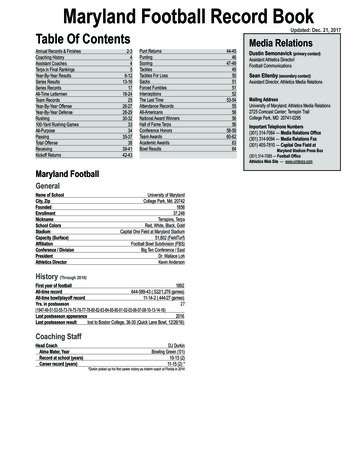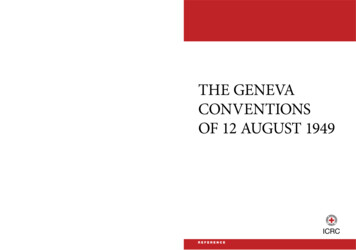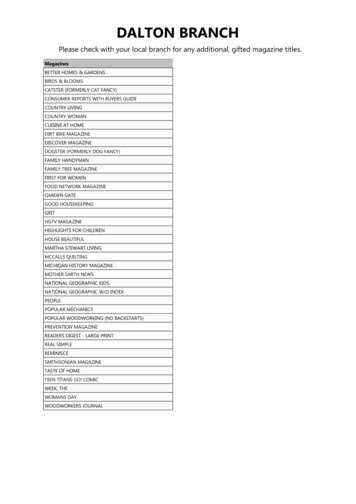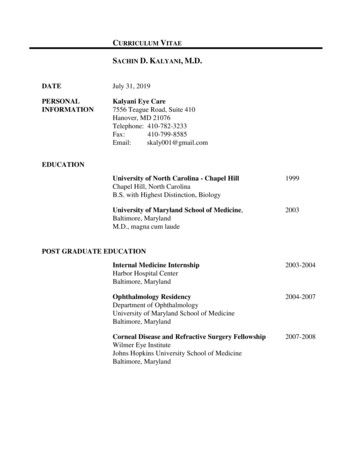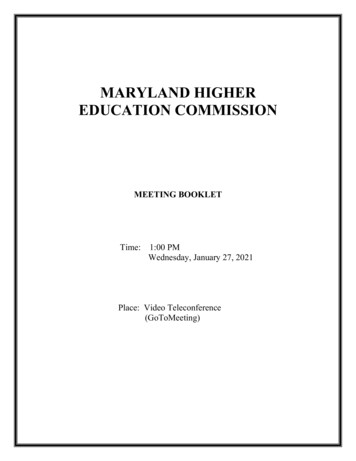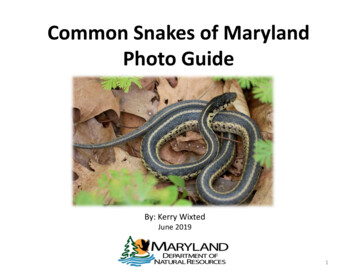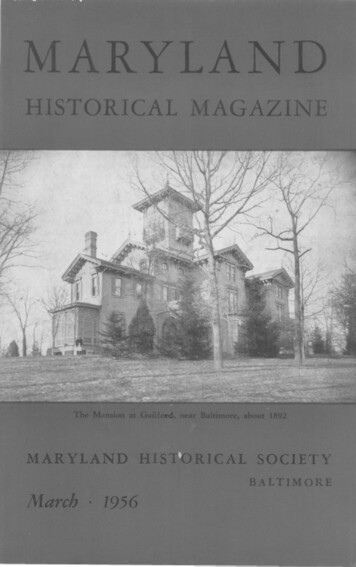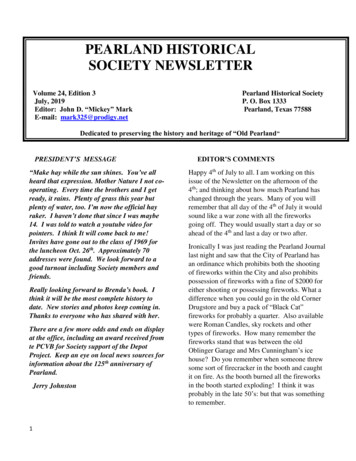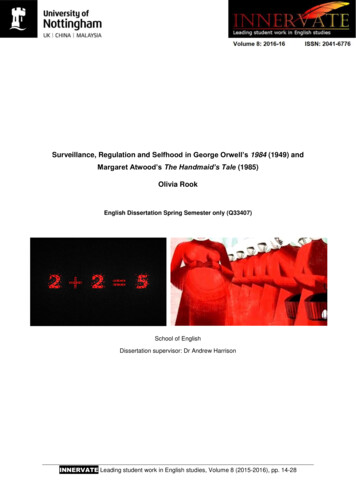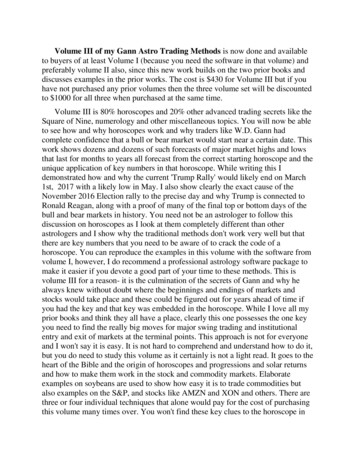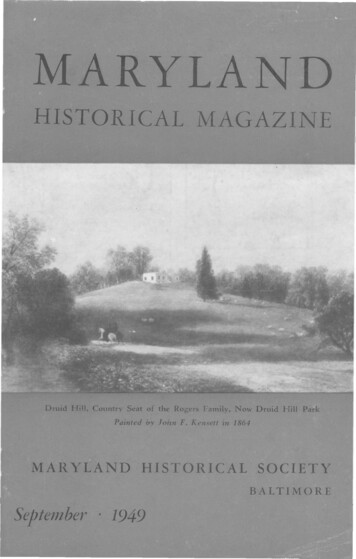
Transcription
MARYLANDHISTORICAL MAGAZINEDruid Hill, Country Seat of the Rogers Family, Now Druid Hill ParkPainted by John F. Kensett in 1864MARYLAND HISTORICAL SOCIETBALTIMORESeptember 1949
SMiMiMiMiiyiiMi iMi iiyiiMii TONGUE, BROOKS& COMPANYIN S U R A NC EtAll CoveragesPHOTO-ENGRAVING CO.«En ravinjsforllie Printer.Merchant aManufacturer "213 Saint Paul Placecflrtists-FnfrdversBaltimore 3 oivarcir'& DxiifeilQ SisOjo/timore yHary/andwrnKmrn mmm mMmmmff*Specializing inANTIQUESAMERICANABOUGHTBOOKS ONANDAMERICAN HISTORYSOLDGENEALOGYLOCAL HISTORYBOUGHT AND SOLDJOHN SCHWARZ2015 N. CHARLES STREETBaltimore, Md.CallUNiversity 0476ICATALOGUESIFREE UPON REQUESTISSUEDSOUTHERN BOOK CO.122 W. FRANKLIN STREETRALTIMOKE, MD.VErnon 8271
MARYLANDHISTORICALMAGAZINEA QuarterlyVolume XLIVSEPTEMBER, 1949Number 3JOHN NELSON'S MISSION TO THEKINGDOM OF THE TWO SICILIES1831-1832By HOWARD R. MARRAROHE United States Government was obliged to makethree separate attempts, extending over a periodof about twenty years, to obtain payment fromthe Kingdom of the Two Sicilies for losses sustained by American merchantmen during the Napoleonic wars in Naples.1 The first of these attempts, made in1816, by William Pinkney,2 of Maryland, ended in failure becausethe restored legitimate government of Ferdinand I of the TwoSicilies was unwilling to assume responsibility for the wrongs committed by Murat,3 who was king during the latter part of the1A good account of the controversy may be found in the Rev. ChristopherPerrotta, The claims of the United States against the Kingdom of Naples. (Washington, D. C, Belvedere Press, 1926). This article on Nelson's mission is basedon unpublished documents in the National Archives, Washington, D. C.2See Howard R. Marraro, " William Pinkney's Mission to the Kingdom of theTwo Sicilies, 1816." Maryland Historical Magazine, XLIII (Dec. 1948), 235-265.'Joachim Murat (1767-1815). Murat distinguished himself as a cavalry leader149
150MARYLAND HISTORICAL MAGAZINENapoleonic regime when the seizures occurred, and for whathappened during the absence of the lawful King and the Government of Naples. The second attempt, made in 1825-1826, withthe mission of John Appleton,4 of Massachusetts, also ended infailure essentially for the same reason.5 The third and final effortwas crowned with success in 1831-1832 with the appointment ofJohn Nelson, of Maryland.So little is known of John Nelson that it may be useful to recordhere the few known facts of his life. He was born in Fredericktown, Md., June 1, 1791, the son of Roger Nelson who, as abrigadier-general in the Revolutionary army, was left for dead onthe field of Camden, but recovered. Afterwards, Roger Nelsonbecame a member of Congress and a district judge of Maryland.John Nelson was graduated at the College of William and Maryin 1811, and two years later was admitted to the bar. He settledto practice law in Fredericktown where he also held several localoffices. He was elected as a Democrat to the Seventeenth Congress, 1821-1823; he was, however, not a candidate for reelectionin 1822 to the Eighteenth Congress. He was appointed UnitedStates Minister to Naples by President Jackson, of whom JohnNelson was an enthusiastic supporter, serving from October 24,1831 to October 15, 1832. More than a decade later he wasappointed attorney-general in President Tyler's cabinet, to succeed Hugh S. Legare, and served from 1843 to 1845. He died inBaltimore, Md., on January 8, I860, and was interred in Greenmount Cemetery.6in the French army during the Napoleonic wars. In 1800 he married Caroline,the youngest sister of Napoleon I. By the decree of Napoleon of July 15, 1808,he was appointed on Aug. 1, to the throne of Naples, which he held until 1815.He called himself Joachim Napoleon, King of the Two Sicilies, but his authoritywas limited to the Kingdom of Naples, and never extended to Sicily proper. Afterthe fall of Napoleon, Murat lost his throne, but returning with a hostile expedition,he was captured, courtmartialed, and shot at Pizzo, Calabria, on Oct. 13, 1815.* See Howard R. Marraro, "John James Appleton's Mission to Naples (182526)", Journal of Central European Affairs, to be published in October 1949. Seealso Henry Merritt Wriston, Executive Agents in American Foreign Relations, TheAlbert Shaw Lectures on Diplomatic History, 1923 (Johns Hopkins Press, 1929),631-633.6Appleton came to the conclusion that his failure was due to the fact that theNeapolitan Government discovered that his powers rendered fear of reprisalsgroundless and that the claims of the United States against France were stillunacknowledged.6United States Congress, Biographical Directory of the American Congress 17741927 (United States Gov't Printing Office, 1928), p. 1351; Lamb's BiographicalDictionary of the United States (Federal Book Co. of Boston, Boston, Mass., 1903),V, 648-649.
JOHN NELSON'S MISSION151Nelson's mission to Naples was important to the country as wellas to many of its citizens, whose interest was deeply concerned inthe negotiation with which he was charged. Briefly, these werethe facts involved in the controversy between the two governments.In the year 1809, while Murat was King of Naples, and neutralswere suffering under the operation of the English orders in council on the one hand, and the Berlin and Milan decrees on theother, which last were also enforced in the Kingdom of Naples,American commerce was almost banished from the ocean, and fewAmerican merchants dared to venture their ships in a trade sohazardous, and subject to so many vexations as that with anycountry in Europe, which was under the influence of France.Naples was one of these countries, being governed by a memberof Napoleon's family. The Berlin and Milan decrees were strictlyenforced in all the ports of the Kingdom of Naples. The consequence was that, without any shipping belonging to the country,and all neutral ships having been banished, the surplus produce ofthe Kingdom could not be exported, and fell in value, and foreignarticles of the first necessity, rose to exorbitant prices. It appearsthat, on March 31, 1809, a modification of the Berlin and Milandecrees was adopted by the Government of Naples, which admitted certain enumerated articles imported in neutral vessels;but finding the Americans reluctant to place themselves in theirpower under the general promise of protection implied by thesedecrees, a special invitation was made to the merchants of theUnited States, by a decree dated June 30, 1809, and officially communicated to Frederick Degan,7 the United States Consul inNaples, by which the Americans, by name, were promised the freedisposal of their cargoes, if accompanied by the usual papers, andprovided, however, they had not been in a port of Great Britain,or had not been visited by her cruisers.As soon as this decree became known, several enterprising merchants of the United States, putting faith in the promises it heldout to them, fitted out vessels with rich cargoes for Naples. The7The Duke of Gallo, Secretary for Foreign Affairs, in his letter to Degan statedthat it was " the intention of His Majesty . . . freely to admit American vesselscoming directly into his ports, provided they had regular papers and had not, bypaying duty to Great Britain, or by submitting to be searched by English cruisers,brought themselves within the decrees of December 21, 1806 and January 9,1808." Degan ceased to be Consul the same year. Alexander Hammett, of Maryland, was appointed to succeed him. Hammett held the post at Naples from June1809 to 1860.
152MARYLAND HISTORICAL MAGAZINEfirst two or three that arrived were fairly dealt with:—theircargoes were sold, their returns were taken in, and they werepermitted to depart without molestation. But when, tempted bytheir show of good faith, an additional number had been drawnwithin their grasp, and the prey became worth taking, the wholewere, by order of King Murat, seized, confiscated, and sold without the slightest pretext. The protests of the shipmasters weredisregarded; the complaints of the American consul treated formany months with contemptuous silence; and when, at long last,an answer was given, the robbery was said to be justified by anAct of Congress which forbade commercial intercourse betweenthe United States and both France and England—an act that didnot concern Naples in the remotest degree and which, havingbeen passed four months before the decree inviting the Americanvessels into the ports of Naples, could never have justified theirseizure after their arrival in Naples. The number of Americanvessels and cargoes thus faithlessly seized and sold was fortynine. Later schedules, on the basis of fuller data, altered thenumber. Furthermore, the masters of some of the vessels wereeven forced to draw bills on their owners, to pay for the portcharges. Several hundred crewmen were left to starve, or weresupported by the American Consul, and although promised a conveyance to their country by the Neapolitan Government, theConsul was obliged to charter a vessel, at the expense of eightor ten thousand dollars, to carry them home. In the year 1812,four other vessels with their cargoes were also seized and soldunder similar frivolous pretexts, by the same Neapolitan Government. This part of the transaction was remarkable from thefact that, at the time of this seizure, several other vessels, underthe American flag, were also under prosecution, but the Consul ofthe United States, being convinced that they were English property,and sailing under forged papers, frankly stated that fact to theNeapolitan courts. This open and proper conduct produced thecondemnation of those vessels which had fraudulently assumedthe use of the United States flag, but did not save those that werebona fide American property. Therefore, their value was addedby the American Government to the amount of the indemnityclaimed first by Mr. Pinkney, then by Mr. Appleton, and finallyby Mr. Nelson.Under these circumstances, the United States Government re-
JOHNNELSON'S MISSION153solved upon Mr. Nelson's mission. Its avowed purpose was tomake a strong and decisive attempt to procure a just indemnityto the injured American citizens, and at the same time assert thehonor of the country which suffered every day that the Government delayed to enforce the demand.The State Department considered the time and circumstances asfavorable for prosecuting the American claims. The time wasappropriate since Mr. Nelson's mission came shortly after France,whose example was followed, and whose authority was reliedupon, had yielded to the justice of the American claims.8 Thecircumstances were also considered favorable since they coincidedwith the commencement of a new reign, when the mind of ayoung prince was presumed to be more susceptible of the feelingsof justice than that of his predecessor, soured by the misfortunesinflicted upon him and his family by the former occupant of histhrone.9 Furthermore, yielding to the insistent demands for asettlement by the New England merchants who continued to sendmemorials to Congress, President Jackson, in his third annual message to Congress, December 6, 1831, pledged himself to secureindemnity for the wrongs committed against American merchantsby Naples and other countries of Europe.10The full power of John Nelson, the plenipotentiary of theUnited States, was dated October 24, 1831, the date of his commission as charge d'affaires at Naples.11 It was in customaryform, authorizing him '" to agree, treat, consult and negotiate ofand concerning general Commerce between the United States andthe government of the Kingdom of the Two Sicilies; and also on8Those claims against France were in the major part for " belligerent depredations " during the Napoleonic wars, subsequent to 1805. For an account of theseclaims and the text of the treaty with France, signed July 4, 1831, see HunterMiller, Treaties and Other International Acts of the United States of America (Gov'tPrinting Office, Washington, D. C, 1933), III, 641-651. With his DespatchNo. 2, Feb. 13, 1832, Nelson sent to Livingston a copy of his [Nelson's] Note toCassaro, dated Feb. 13, 1832, enclosing a copy of a convention between Franceand the United States, as agreeable to the wish expressed by His Excellency at theinterview. It would seem that this was done to register at once with his government at home the fact that Cassaro had made this expressed request for the textof the treaty with France. For a full discussion of the French claims, see Annalsof the 22nd Congress, 2d session, 1202-1297."Ferdinand II (1810-1859). The son of Francis I. Ferdinand became King ofthe Two Sicilies Nov. 8, 1830. He reigned to his death which occurred on May 22,1859. He was known by the appellation of King Bomba.10American merchants also had outstanding claims for spoliations against France,Holland, Denmark, and Spain.11Department of State, 2 Credences, 171, 172.
154MARYLAND HISTORICAL MAGAZINEthe subject of Indemnities claimed by Citizens of the United Statesfrom that Government, in reference to the sequestration and confiscation of their property within the Neapolitan dominions, andall matters and subjects connected therewith, and to conclude andsign a Treaty or Treaties, Convention or Conventions touching thepremises "; but his instructions of October 27, 1831, precluded himfrom an agreement regarding the American claims.12Secretary of State Edward Livingston " in his Instruction No. 2,dated Washington, October 27, 1831, informing Mr. Nelson ofhis appointment, stated that the facts on which the demand wasbased were simple, had never been disputed, and the right whichwas deduced from them was founded on the clearest and bestestablished principles of the laws of nations. For this reason, Mr.Appleton's instructions to Mr. Nelson were precise, but the Secretary of State made it clear that they required in their execution asteadiness of purpose not to be diverted from the object of Mr.Nelson's mission by arguments, however plausible, or retarded bythe usual resources of diplomatic ingenuity.Specifically, Mr. Nelson was instructed to convince the Government of the Two Sicilies that the United States were in earnest inexacting the full indemnity so long due to her citizens. Mr.Nelson was told to stress the desire of the President to cultivatefriendly relations with the Government of the Two Sicilies, andof his desire to increase the commercial relations between the twopeoples. Mr. Nelson, however, was to emphasize the fact thatan indispensable preliminary was the settlement of the long deferred claims of American merchants. The President of theUnited States indulged the sincere hope that His Majesty wouldat once perceive and acknowledge that the American demand waswell-founded, and thus signalize the commencement of his reignby an act of justice, that would at once have increased his reputation, secured the good feeling of a friendly power, and in the endpromoted an intercourse that in a single year would produce moreadvantage to his people than the whole amount of the indemnitydemanded.14 Mr. Nelson was further instructed to anticipate the12Documents relating to the Convention with Sicily. Senate Document No. 70,22nd Congress, 2nd session, serial 230; Department of State, 13 Instructions,United States Ministers, 260-68. Hunter Miller, op. cit. Ill, 711-721." Edward Livingston, of Louisiana. Commissioned Secretary of State by President Jackson, May 24, 1831. Commissioned as Envoy Extraordinary and MinisterPlenipotentiaryto France, May 29, 1833, and retired that day from the former post.11The commerce and navigation statistics of the United States in those years
JOHN NELSON'S MISSION155objections of the Neapolitan Government to the American claim—objections which were derived from alleged usurpation of Murat.In reply to these objections, Mr. Nelson was authorized to statethat the liability of the nation to make good all the engagementsmade, to redress all the injuries done, and to profit by all the justadvantages acquired by its Government de facto, was too wellestablished in the code of nations, and too recently and generallyexemplified in their practice to be then denied even in argument;that one nation can only look to the acknowledged and peaceablepossessor of the political and civil power in another; that a contrary doctrine would produce a continual intervention between theindependent powers, injurious to the right of self-government ineach—a position which the United States would never assume withrespect to other nations, nor suffer to be taken with respect tothemselves. Therefore, Mr. Nelson was to make clear that hisGovernment confidently expected that this ground of oppositionto America's demand would no longer be insisted upon, and as,from the documents relating to the affair, no other had ever beenadvanced, the American minister felt certain that the NeapolitanGovernment was then prepared to treat for the long expectedindemnity without any unnecessary delay, and enable him toannounce to the American merchants that the long period during which they had waited for justice, was at length drawing to aclose; and to the nation, that their reliance on the honor andgood faith of His Majesty, had not been disappointed.Mr. Nelson's instructions also advised him to convey to theNeapolitan Government in strong but respectful language, theidea that it was a firm resolve of the President, on his enteringon the duties of his office, to assert in the most efficacious mannerthe rights and claims of the merchant class of his fellow-citizensupon foreign governments; that his avowed principle was to makeno demand not founded on justice; but as far as his functionspermitted, to submit to no wrong; that he had carefully examinedall the circumstances of the American demand upon the Neapolitan Government; that the principle upon which it was foundedappeared to him incontestable; and that, therefore, Mr. Nelson'smission had been decided upon in order to bring it to a close, togave separate figures for Sicily and for Italy and Malta, but no separate entry forNaples. It is, therefore, not possible to estimate the value of the imports andexports from the Two Sicilies. See United States, House of Representatives.Treasury Department. 22nd Congress, 1st Session. Document No. 230.
156MARYLAND HISTORICAL MAGAZINEthe end that if, unfortunately, a satisfactory answer should bedenied, or delayed, up to the period necessary for communicationto Congress, the President might submit to that body a statementof the demand he had made and afterwards execute whatevermeasures it deemed necessary to pursue for the protection of theirfellow-citizens, and the honor of the conutry.15This being a negotiation in which, of all America's other foreignrelations, strength of argument and firmness of purpose were tobe united with courtesy of manner and language, due as well toothers as to ourselves, Secretary of State Livingston informed Mr.Nelson that the Government congratulated itself in his acceptanceof a duty as important to private interest as well as public reputation, and which his [Nelson's] talents rendered him so fit toperform.The Secretary of State wished to impress firmly upon Mr.Nelson's mind, and through him upon the Neapolitan Government, that the period for procrastination was past, that everydiplomatic evasion of the result was considered as a denial, andthat it was necessary that a communication of the result be madeto Congress, who, most probably, would take such measures asensured full compensation.As a means of carrying out the general principle of the negotiation, if that was conceded, Mr. Nelson was instructed that theacceptance of a sum in gross, to be distributed among the claimantsby a commission created by an act of Congress was to be preferredover any other means. Besides demanding full compensation, Mr.Nelson was to claim the interest during twenty years, for theinjuries offered to the seamen and merchants, and the expensesto which the Government was put for sending these men home.All these, added to the principal, made a considerable amount,from which Mr. Nelson was not to retrench until he arrived at asum that satisfied the claimants. It was not to be much, if anything, less than the amount of the ships and cargoes. However,16In his third annual message to Congress, December 6, 1831, President Jacksonreferred at length to Nelson's mission, adding: ". and I feel the fullest confidence that the talents of the citizen commissioned for that purpose will placebefore him [His Sicilian Majesty} the just claims of our injured citizens in suchlight as will enable me before your [the Congress'} adjournment to announce thatthey have been adjusted and secured. Precise instructions to the effect of bringingthe negotiation to a speedy issue have been given, and will be obeyed." See, JamesD. Richardson, A Compilation of the Messages and Papers of the Presidents 17891897. (Washington, D. C, 1896), III, 1113.
JOHN NELSON'S MISSION157Mr. Nelson was also instructed to take every precaution in hispower to prevent the admission into his estimate o all unfoundedclaims, and to reduce exaggerated estimates to their just value.The expenses of the Government in returning the seamen andsupporting them was to be insisted upon as a point of honor fromwhich no deduction was possible.Since Congress was expected to remain in session until the firstof May, the result of Mr. Nelson's mission was to be made knownto them during the beginning of April, and was to be sent, at thelatest, if no direct opportunity offered, by one of the vessels of theMediterranean Squadron,18 on the first of March. Because Mr.Nelson was not expected to reach Naples before the latter part ofDecember, he had no more than two months to obtain a definitiveanswer. For this reason Mr. Nelson early in the negotiations,was told by Secretary Livingston, to take occasion to state to theNeapolitan Government that it was required by that time.With these specific and detailed instructions, in his possession,Mr. Nelson set sail from New York on November 8, 1831. Aftera brief stay in London, he went to Paris. Leaving the Frenchcapital on December 27, he travelled via Lyons, Nice, Genoa,Pisa and Rome with all possible despatch, in the hope of accomplishing his journey in nine or ten days. However, with the mostanxious diligence, he was not able to reach Naples till late in thenight of January 19, 1832.After having found suitable living accommodations, on January23, Mr. Nelson addressed a note to Prince Cassaro," Minister,Secretary of State for Foreign Affairs, informing the Neapolitanof his arrival, and asking an interview so as to present his letter ofcredence. This was done on January 25, and on Sunday, January16The detailing of a war ship to " bring the treaty home" was sufficientlyunusual an occurrence, in view of the rank held by Mr. Nelson, to indicate thatthere was urgency in getting it ratified in the United States. There was no intimation that the presence of the American Squadron in the Mediterranean or of thisship " to convey the treaty home " had any ulterior motive. However, as will benoted later, Commodore Patterson felt that he had had a share in Nelson's success.17Antonio Statella, Prince of Cassaro (1785-1864). He was the son of Francesco Maria, the first Prince of Cassaro. Antonio Statella was sent as envoyextraordinary to Sardinia; ambassador extraordinary to Spain; envoy and ministerextraordinary to Vienna. He was minister of foreign affairs ad interim from Jan.26, 1830; minister of foreign affairs from July 27, 1830 to March 20, 1840; finallyfrom March 13 to June 25, I860, he was president of the Council of Ministers ofFrancis II. On the Prince of Cassaro, see: Ruggero Moscati, Verdinando U diBorhone nei documenti diplomatici austriaci (Naples, Edizioni Scientifiche Italiane,1947.) In this publication Cassaro's entire political career is traced and developedfrom unpublished documents in the archives of Vienna and Naples.
158MARYLAND HISTORICAL MAGAZINE29, Mr. Nelson was received by the King "" with much apparentcordiality." 18On January 31, Mr. Nelson transmitted to the Prince of Cassaroa note explanatory of the objects of his mission. In this note,the American charge d'affaires followed very closely the instructions he had received from the Secretary of State. Since thePrince of Cassaro failed to reply to this note, Mr. Nelson askedand obtained another interview at the Foreign Office, which wasgranted on February 11, 1832. Being still without a reply to hiscommunication of January 31, although it had been explicitlypromised, Mr. Nelson availed himself of a casual meeting, onFebruary 18, to remind the Prince of Cassaro of his engagement,and to express his regret that it had not been fulfilled. The Neapolitan Foreign Minister showed a good deal of embarrassment,earnestly assuring Mr. Nelson, to use the Prince's own language, that it was not his fault; and that the President of theNeapolitan Council had not convened that body, as soon as hehad expected, but that it would assemble on February 20, whenthe answer to Mr. Nelson's demands would certainly be communicated to him. Mr. Nelson expressed his anxious desire toreceive it, and his apprehension that longer delay might be regarded by the United States Government as indicative of an indisposition in His Majesty's council to do justice to American merchants; and coerce it to resort to measures which it was solicitious,if possible, to avoid. However, this last assurance by the Princeof Cassaro, like that tendered in the conference of February 11,remained unredeemed.Notwithstanding these repeated disappointments, it was Mr.Nelson's intention, as the period limited by his last note to thePrince of Cassaro approached, to have sought a second personalinterview with him, when to Mr. Nelson's utter surprise he wasinformed that the Prince of Cassaro had left Naples for Sicilywhere he was likely to be detained for some time. Mr. Nelsonhad not received the slightest intimation of the Prince of Cassaro'sintention to be absent from Naples, and although other considerations were alleged to have influenced the Prince of Cassaro's visit18Referring to the " apparent cordiality," the American Annual Register 1833,p. 20, explained it by suggesting that " the ominous name of Nelson for Naples wasfraught with recollections of bombarded capitals and exacted indemnities. Thegreat English admiral had been a terror in the Mediterranean as long as Murat andNapoleon were in power." Perrotta, op. cit., p. 53.
JOHNNELSON'SMISSION159to Palermo, there was good reason for the belief that the opportunity it afforded of avoiding the necessity, with some show ofexcuse, of answering the demands he had preferred, was notentirely unappreciated. Meanwhile, information derived fromvarious sources had satisfied Mr. Nelson that it was the policy ofthe Neapolitan Government to postpone the negotiation concerning the American claims as long as practicable. By deferring thediscussion, in the opinion of Mr. Nelson, the Neapolitan Government hoped to render impossible the anticipated action of Congress upon the subject, during that session; and to place itself in aposition, which would enable it to avail itself of any circumstances, which might occur, to justify the further postponementof its consideration thereafter. It was generally supposed, however, that in the end, the Neapolitan Government would gratifyAmerican demands, but that it would put off the evil day, as longas consistent with its own security. Mr. Nelson had every reasonto believe that this supposition was correct.In his Despatch No. 3, bearing the date line, Naples, March 12,1832, informing Secretary of State Livingston of the progress ofthe negotiations, Mr. Nelson expressed the hope that the President would be satisfied that he [Mr. Nelson} had exerted everyeffort to meet his expectations and to bring this negotiation to aspeedy issue. Mr. Nelson deeply regretted his failure to accomplish the object of his mission within the period contemplated byhis instructions. He added, however, that he had every confidencethat this failure would be readily referred to its true cause, namely,the predetermination of the Neapolitan Government, to avoid thediscussion of the American claims, as long as it could, and to payonly when it was convinced that it had to.In another despatch, unnumbered and marked " private," datedNaples, March 12, 1832, to Secretary of State Livingston, Mr.Nelson reiterated his own firm persuasion that a reply to his noteswould be delayed, as long as possible, and when given, that itwould be so framed, as studiously to avoid the discussion of thequestions involved in the negotiation. Mr. Nelson did not believethat the Government had sufficient firmness, whatever its inclinations were, to give a positive answer of refusal to the Americandemands. The American charge d'affaires was quite sure, however, that if it yielded, the result was due to its apprehensions,rather than to its sense of justice. The most effectual means of
160MARYLAND HISTORICAL MAGAZINEbringing the negotiation to a close, within any reasonable time,according to Mr. Nelson, was to satisfy His Majesty of the powerof the President to resort to measures of coercion, if redress waslonger withheld. Mr. Nelson suggested that an act of Congressinvesting the Executive, with authority, to employ naval force, toenforce America's just demands, if satisfactory arrangements werenot concluded by a limited day, would result in the prompt accomplishment of all America's purpose. Anything short of this, Mr.Nelson feared, would encourage the belief, that this negotiation,like those of 1816 and 1825 could be dismissed, without hazardto Neapolitan interests.Meanwhile, on inquiry, Mr. Nelson had discovered that therevenues of His Majesty were ample, and, therefore, he woul
Druid Hill, Country Seat of the Rogers Family, Now Druid Hill Park . was crowned with success in 1831-1832 with the appointment of John Nelson, of Maryland. . the youngest sister of Napoleon I. By the decree of Napoleon of July 15, 1808, he was appointed on Aug. 1, to the throne of Naples, which he held until 1815. .

